#literary chinese
Text
the chinese "i love you"
So it feels like people never say "I love you" in chinese. 我爱你.
Since old poetry in the Warring States era and such, people have been using more metaphorical or discreet ways to express affection, for instance "I'm thinking of you" or "I miss you" (eg. the character 思 sī), instead of "love". They consider these less literal means more literary and beautiful.
The two classical poems that immediately come to mind would be these:
山有木兮木有枝,心悦君兮君不知。——〈越人歌〉
rough translation: the hills have trees and the trees have branches; I love you but you do not know.
and the other:
彼采葛兮,一日不见,如三月兮。——〈王风·采葛〉
rough translation: the girl picking the arrowroot, I haven't seen her for one day, and it feels I haven't met her for three months.
The poem then progresses to two more stanzas of the similar structure, from three months to three seasons (nine months) and to three years.
"Love" may be used as a more abstract idea, or in philosphical contexts, say confucianism and mohism, to mean compassion and charity, loving everyone, loving regardless something something, etc.
But in all honesty people are just more timid. And culturally speaking, I might put 喜欢 (xǐ huān) on a spectrum between "love" and "like", it already carries that meaning of love, if just not as heavy.
As such, in novels set in older eras they may prefer terms like "心悅/傾慕" (xīn yuè / qīng mù) to mean I like you, and in modern ones they like using 喜欢, also meaning "like", as shyer ways of expressing love.
And so it's usually in the traumatic breakdowns and emotionally charging scenes in the depths of the night that they actually use the phrase "I love you".
#danmei#cdrama#chinese language#language#classical chinese poetry#love language#chinese#literary chinese#cnovel#fate's meta
78 notes
·
View notes
Text
It is with tremendous pleasure that I announce that I am, finally, for the first time, about to embark on reading an un-edited original text in literary/classical Chinese. Making things better (because older is cooler) said text is from the Warring States-era.
#Chinese#Chinese language#learning Chinese#literary Chinese#tbh I could have done this way sooner#plenty of people start learning literary Chinese after like a year or two of Chinese#or sometimes after literally no Chinese#and I'm still veeeery early on in my study of literary Chinese#but still#I'm super pumped#climbing the mountain of being able to read ancient documents is very exciting to me.
3 notes
·
View notes
Text
To me Classical Chinese always felt futuristic, a language of an advanced space-faring civilization, rather than something from ancient and medieval China.
1 note
·
View note
Text
"You know what I think? I think this whole concept of women being docile and obedient is nothing but wishful thinking. Or why would you put so much effort into lying to us? Into crippling our bodies? Into coercing us with made-up morals you claim are sacred? You insecure men, you're afraid. You can force us into compliance, but, deep down, you know you can't force us to truly love and respect you. And without love and respect, there will always be a seed of hatred and resistance. Growing. Festering. Waiting."
Xiran Jay Zhao, Iron Widow
#Xiran Jay Zhao#Iron Widow#female rage#rage#resistance#International Women's Day#women#Chinese literature#BIPOC author#quotes#quotes blog#literary quotes#literature quotes#literature#book quotes#books#words#text
175 notes
·
View notes
Text
the true horror of Sun Wukong at the beginning of the journey was his complete lack of empathy. He could kill hundreds in the blink of an eye and not feel a thing for them. That’s why he needed the golden fillet, To make him feel what his victims felt.
And yet it didn’t work. Sun Wukong kept killing until he had to fight his biggest enemy, himself
The Six Eared Macaque represented his hostility, his lack of empathy, his malice. He was the part of Sun Wukong that wanted to get revenge on his master for banishing him from the journey, the part that thought he did nothing wrong and didn’t deserve punishment.
When he looked at the Six eared Macaque he realized that he didn’t want to be that person . so when he killed macaque he killed that part of himself and he went back on the journey, this time much more willing to change.
#jttw#chinese mythology#sun wukong#six eared macaque#jttw analysis#literary analysis#Sun Wukong angst#journey to the west#Lmk
231 notes
·
View notes
Text
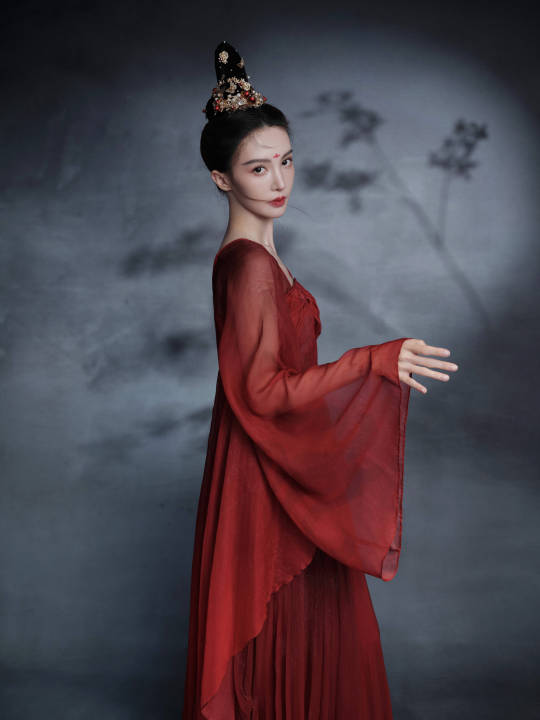
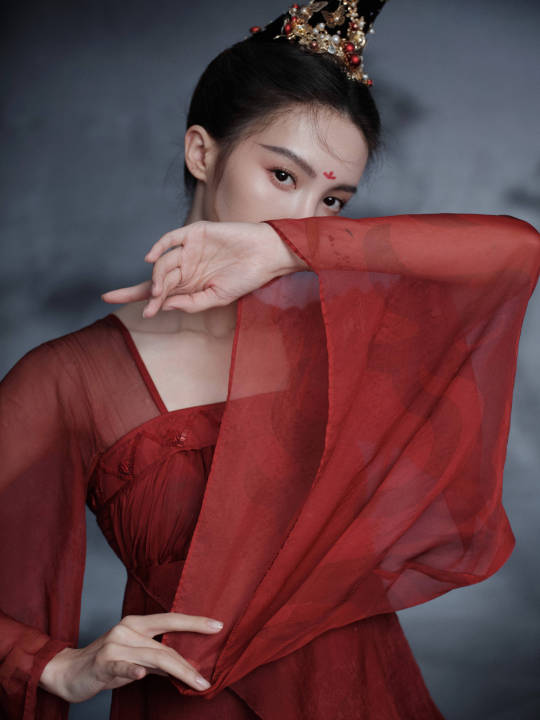

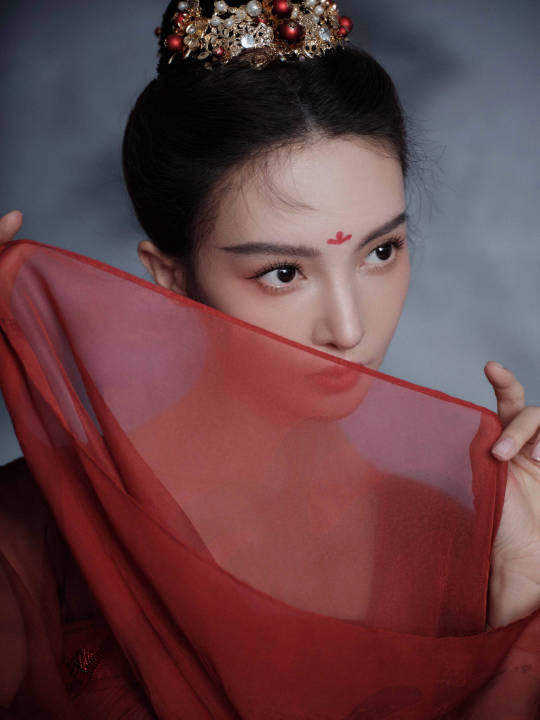
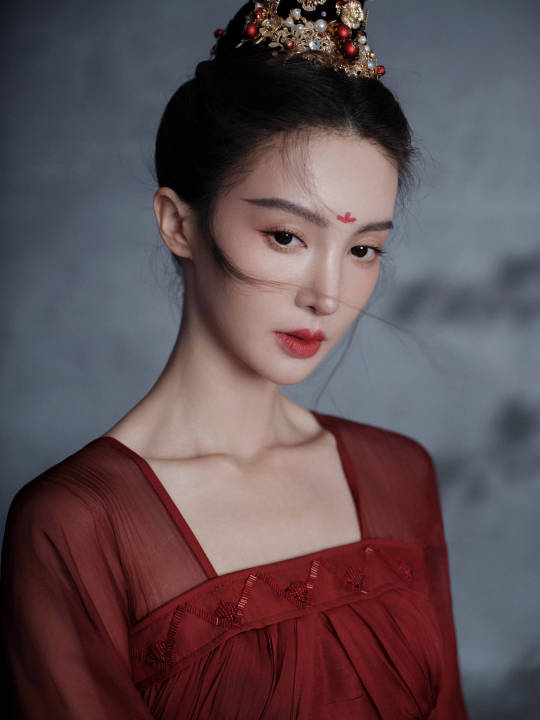



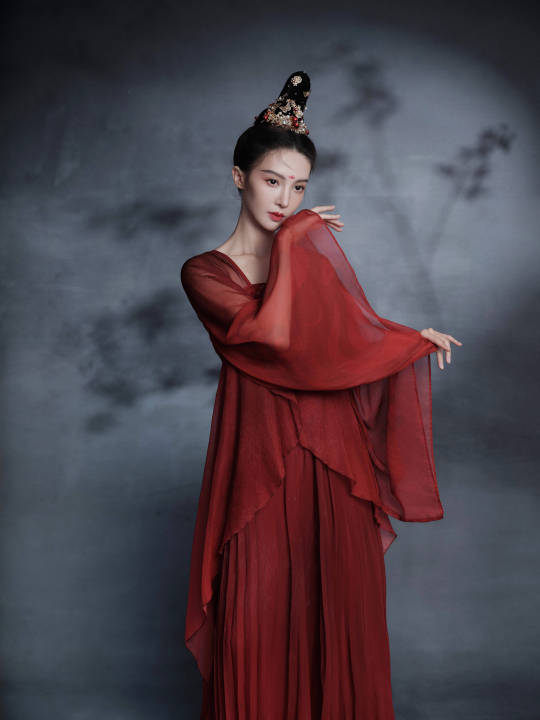

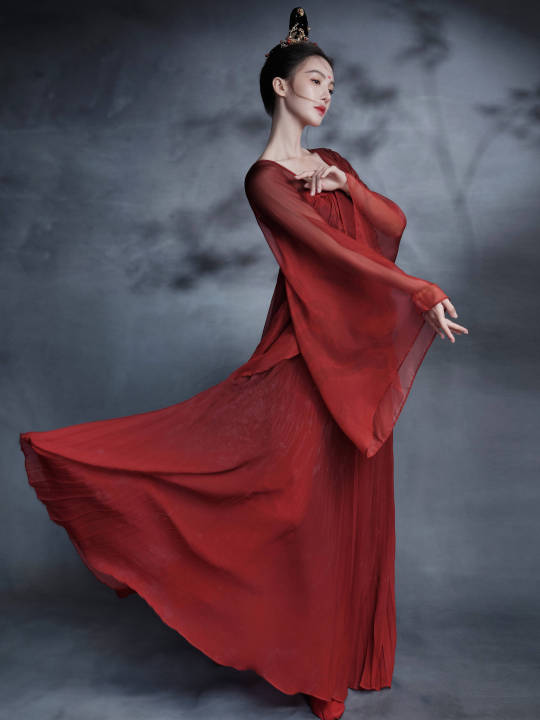

JIN CHEN 金晨 in hanfu photoshoot | China Federation of Literary and Art Circles 2024 Spring Festival Gala
Jin Chen: more photos here
China Federation of Literary and Art Circles 2024 Spring Festival Gala : more photos here
hanfu photoshoot: more photos here
#jin chen#gina jin#金晨#chinese actress#chinese fashion#fashion#cnladies#China Federation of Literary and Art Circles 2024 Spring Festival Gala#gala#spring festival gala 2024#spring festival#spring festival gala#year of the dragon#hanfu#hanfu photoshoot#chinese hanfu#hanfu girl#hanfu fashion#red hanfu
22 notes
·
View notes
Text
the unofficial ultimate bungo stray dogs reading list
this is mainly for myself bc i rly do want to read most if not all of these and i'm sure it's already been done by someone somewhere. but, i thought why not post it lmao; most if not all of these can be found on anna's archive, z-library, or project gutenberg! (also, consider buying from your local bookstore!) for those that are a bit harder to find, i've included links, though some are from j-stor and would require login to access.
detective agency:
osamu dazai:
no longer human (novel)
the setting sun (novel)
nakajima atsushi:
the moon over the mountain: stories (short story collection)
light, wind and dreams (short story)
fukuzawa yukichi:
an encouragement of learning (17 volume collections of writings)
all the countries of the world, for children written in verse (textbook)
yosano akiko:
kimi shinitamou koto nakare (poem)
midaregami (poetry collection)
edogawa ranpo:
the boy detectives club (book series)
japanese tales of mystery and imagination (short story collection)
the early cases of akechi kogoro (novel)
kunikida doppo:
river mist and other stories (short story collection)
izumi kyouka:
demon lake (play)
spirits of another sort: the plays of izumi kyoka (play collection)
tanizaki junichirou:
the makioka sisters (novel)
the red roof and other stories (short story collection)
miyazawa kenji:
ame ni mo makezu; be not defeated by the rain (poem)
night on the galactic railroad (novel)
strong in the rain (poetry collection)
port mafia:
mori ougai:
vita sexualis (novel)
the dancing girl (novel)
nakahara chuuya:
poems of nakahara chuya (poetry collection)
akutagawa ryuunosuke:
rashoumon (short story)
the spider's thread (short story)
rashoumon and other stories (short story collection)
ozaki kyouyou:
the gold demon (novel)
higuchi ichiyou:
in the shade of spring leaves (biography and short stories)
hirotsu ryuurou:
falling camellia (novel)
tachihara michizou:
in mourning for the summer (poem)
midwinter momento (poem)
from the country of eight islands: an anthology of japanese poetry (poetry collection)
kajii motojirou:
lemon (short story)
yumeno kyuusaku:
dogra magra (novel)
oda sakunosuke:
flawless/immaculate (short story)
sakaguchi ango:
darakuron (essay)
the guild:
f. scott fitzgerald:
the great gatsby (novel)
the beautiful and the damned (novel)
edgar allen poe:
the raven (poem)
the black cat (short story)
the murders in the rue morgue (short story)
herman melville:
moby dick (novel)
h.p. lovecraft:
the call of cthulhu (short story)
the shadow out of time (novella)
john steinbeck:
the grapes of wrath (novel)
of mice and men (novel)
lucy maud montgomery:
anne of green gables (novel)
the blue castle (novel)
chronicles of avonlea (short story collection)
louisa may alcott:
little women (novel)
the brownie and the princess (short story collection)
margaret mitchell:
gone with the wind (novel)
mark twain:
the adventures of tom sawyer (novel)
adventures of huckleberry finn (novel)
nathaniel hawthorn:
the scarlet letter (novel)
rats in the house of the dead:
fyodor dostoevsky:
crime and punishment (novel)
the brothers karamozov (novel)
notes from the underground (short story collection)
alexander pushkin:
eugene onegin (novel)
a feast in time of plague (play)
ivan goncharov:
the precipice (novel)
oguri mushitarou:
the perfect crime (novel)
decay of the angel:
fukuchi ouchi:
the mirror lion, a spring diversion (kabuki play)
bram stoker:
dracula (novel)
dracula's guest and other weird stories (short story collection)
nikolai gogol:
the overcoat (short story)
dead souls (novel)
hunting dogs: (i must caveat here that the hunting dogs are named after much more comparatively obscure jpn writers/playwrights so i was unable to find a lot of the specific pieces actually mentioned; but i still wanted to include them on the list because well -- it wouldn't be a bsd list without them)
okura teruko:
gasp of the soul (short story; i wasn't able to find an english translation)
devil woman (short story)
jouno saigiku:
priceless tears (kabuki play; no translation but at least we have a summary)
suehiro tetchou:
setchuubai/a political novel: plum blossoms in snow (novel)
division for unusual powers:
taneda santouka:
the santoka: versions by scott watson (poetry collection)
tsujimura mizuki:
lonely castle in the mirror (novel)
yesterday's shadow tag (short story collection; i was unable to find a translation)
order of the clock tower:
agatha christie:
and then there were none (novel)
murder on the orient express (novel)
she is the best selling fiction writer of all time there's too much to list here
mimic:
andre gide:
strait is the gate (novel)
trascendents:
arthur rimbaud:
illuminations (poetry collection)
the drunken boat (poem)
a season in hell (prose poem)
johann von goethe:
faust
the sorrows of young werther
paul verlaine:
clair de lune (poem, yes it did inspire the debussy piece, yes)
poems under saturn (poetry collection)
victor hugo:
the hunchback of notre-dame (novel)
les miserables (novel)
william shakespeare:
romeo and juliet (play)
a midsummer nights' dream (play)
sonnets (poetry collection)
the seven traitors:
jules verne:
around the world in 80 days (novel)
journey to the center of the earth (novel)
twenty thousand leagues under the seas (novel)
other:
natsume souseki:
i am a cat (novel)
kokoro (novel)
botchan (novel)
h.g. wells:
the time machine (novella)
the invisible man (novel)
the war of the worlds (novel)
shibusawa tatsuhiko:
the travels of prince takaoka (novel; unable to find translation)
dr. mary wollstonecraft godwin shelley
frankenstein (novel)
#bungo stray dogs#bsd#literature#dark academia#reading list#academia#i'm sure there's people i've missed but i did my best LOL#this also really throws into a stark contrast how relatively un-worldly american literary curriculums really are#obviously; it makes vague sense to focus american literary schooling on the western 'canon' bc so much of the english language#is influenced by it and the 'culture' is more touched by it but HOLY SHIT does it just... astound me#how uneducated i am on even east asian literature (from wheremst i technically hail!!!)#i know like.... maybe 3?? 4??? chinese writers off cuff???#like the only reason i even know anything about jpn literature is i got my minor in jpn so i read some stuff but WOWWWWW there's a wORLD.#the fact that i knew not a SINGLE work by most of these jpn writers but as soon as we got to the guild members#i didn't even have to fucking google/wiki -- i just KNEW off the top of my head#kinda fucked up tbh;;;;#anyway this list is massive but i think at least dipping my foot into some of the poems/short stories will be fun
61 notes
·
View notes
Text
assorted ramblings之最
absolutely entranced and delighted by the use of 最 as a noun meaning ‘utmost, best, greatest’
you have some very normal and expected sentences like 世界之最 ‘number one / the best in the world’, 中华之最 ‘number one / best in China’, 历史之最 ‘the utmost / best in history’
but then you have some absolutely wonderful usages like

ok but. there is no word for scenery here. this just says ‘blah blah out country’s Most nature’. just. the most nature

but there’s no interesting! or aspects!!!!! the Most diamond
yes, before anyone yells at me, I am very aware that it is possible to translate these idiomatically and it all makes sense
however.
this construction is FASCINATING. because this last one - 世界钻石之最 could be translated (I would translate, if I hadn’t seen it?) to ‘the greatest among the diamonds of the world’, where the 最 automatically references a) the noun previously mentioned, and b) the scope previously mentioned (i.e. the diamonds In the world)
pleco actually has a similar sentences 钻石之最 which it does translate as ‘the best (or biggest) of all the diamonds’, so 最 here roughly functions like the adjective ‘utmost’ in english. you can’t say ‘the most diamond’ in non-meme language, but you CAN say ‘the utmost diamond’, though it’s still marginal (native english speakers below: tell me whether these reads naturally to you or not).
but in the sentences above, 世界钻石之最, it’s almost like a classical construction in that we’ve got an implied missing noun here. the MOST [...] [...] of the world’s diamonds. the most what?? fill it in yourself, you bastard. this could also be translated I think as ‘the most interesting aspects’ (keeping their translation) of the world’s diamonds. that means something slightly different to ‘the most interesting aspect in the world’ (which happens to be about diamonds).
this is a question about scope!! and the relationship between the three ‘nouns’(used loosely because 最 is a noun-y kind of quantifier or a quantifier-y kind of noun? pushing the boundaries of nounhood either way) in this sentences: the world, the diamonds, and the Most. this is Fine.
this is a great example of how funky compounding can get in mandarin, and how it can be very...ambiguous is not the right word, because that implies that there is one correct answer and with access to context it would be clear. but how there can be multiple possible readings available at one time, which context may in fact not clear up at all. a topic for another day, and one I’ve talked about vaaaaaaguely before
(side note: it’s kind of annoying searching for this construction since it mostly appears just as a little more formal version of 最. for example 患难困苦,是磨炼人格之最高学校. here you could just substitute 之最高学校 with 最高学校 and it would mean exactly the same thing)
anyway. there are plenty of vague ones like 人生之最. the most What in life? just the most????? the best thing? or perhaps if there was another sneaky noun somewhere before it (like the diamond and world example) the best That Thing in life? I honestly don’t know. this is not an informative post. this is a thought, out loud, in real time. expect questions, not answers!!
and then you have other ones which are soooooooo topic-comment that they are just BEGGING for me to put a 也 at the end and whack them in a textbook. for example: 参军当兵光荣之最 ‘participate-army serve-as-soldier honour-之最’ > where is my ‘is’??? where is my verb??? you fool. you coward. in this house we need neither. remember that the A = B, the copula, the most basic relationship between the subject and the predicate can be expressed in chinese by just AB. for example: 宋,小国. song = a small country. this is usually marked with commas in anything from ye olden times when put in textbooks to make it easier to parse. but it could also be 宋小国 and that would mean the same thing. (this is very visible when we look at the way that adjectives work: 山高 or more helpfully punctuated 山, 高 is ‘as for the mountain, it is tall’ or ‘it tall-s’ as 高 is an adjective and technically therefore a stative verb.)
so this sentence could be rephrased 参军当兵, 光荣之最. to translate it with the clunky way japanese-english translators often do when being literal: ‘as for participating in the army and serving as a soldier, it is the greatest honour’ / ‘..., it is the greatest part of the honour’ depending on how you parse the 之最. let’s add the affirmative particle / comment marking particle 也 (no it doesn’t mean also here; remember lwj’s 非也!when defending wwx on the steps of jinlintai) which it is BEGGING for and we get:
参军当兵, 光荣之最也.
how very classical!!!! how very nice!!!
we could also go one step farther and add a topic-marking particle 者 (yes, you most likely know this as a nominaliser but it has a far greater range of usage than that):
参军当兵者, 光荣之最也
woweeee. such vibes. truly the Most sentence.
....this got wildly off track. anyway. my point is that in-depth linguistic speculation about how it actually works and musings on translation practices aside, I am going to enjoy thinking about ‘he is truly the Most character’ every time I see this construction
#meichenxi manages#this got very off topic but there wasn't really a topic to begin with#I just thought. as linguistic constructions goes. it's kind of funny#this!!!!!! is what I mean about all word classes in chinese being fake and lies#they Do just vibe#obligatory disclaimer: this is a post about THOUGHTS they may be WRONG I am THINKING#using my BRAIN and not a BOOK and therefore I may be STUPID#also I use classical in the very 'what is' sense i.e. also literary
119 notes
·
View notes
Text
friendly neighborhood asian hot take: sometimes because you're writing chinese muses in english in rpc it's okay to 'romanize' and be anachronistic about certain things. obviously, do your research - but 'modern language' is used even by chinese writers doing stories set in ancient times. we're never going to be fully accurate anyway because we're writing in 白话文 and not 文言文 (actual classical ancient chinese vernacular) so.
#ooc#((all that is to say))#((i wouldn't obsess literary things that are hard to translate if i were you))#((bc odds are english can't really capture the exact nuances of the circumstance anyway))#((yes i am once again thinking about the wildness that is chinese address ok shhh))
7 notes
·
View notes
Text

the true story of how a girl got rid of her stalker in 18th century China, as recounted in The Shadow Book of Ji Yun
what a Legend
#the shadow book of ji yun#these 18th centry chinese tales of the strange collections are so good one of my fave literary genres#literature#chinese literature#spooky girls tag#ghosts#my posts#words#zhiguai#nu gui
8 notes
·
View notes
Text
long darkness — cháng yīn 长喑 translation
cháng yīn 长喑 // long darkness
a fan-made song on Xiao Jingyan. I have always been a Mei Changsu over XJY person, but this song from his pov really worked for me and let me see the weightedness of XJY's crown, so I wanted to share it with more.
song link in comment below. (bilibili . com / video / av10441457/)

长剑出鞘冷锋芒 十三载意难忘
缓歌曼舞九重宫 朔风黄沙麾旗扬
手足血脉埋青冢 挚友良弓唯锈藏
岂能折腰屈膝没忠良
the long sword unsheathes from the scabbard, its cool blade revealed. thirteen years, and hard it is to forget.
leisured, soothing melodies with graceful dances at the ninefold palace; north wind and yellow sand with the billowing ensign in the desert. *[1]
brothers-in-arms and brothers in blood in tombs buried, graves long covered in grass; dear friends and cherished bow stored away, now left only to rust —
how is one to bend and kneel, and bury the names of the honourable and the good?
挑灯不眠千军帐 逐千里护家邦
玉壶冰心铁骨铮 扬眉冷看覆风浪
当时少年且横枪 凝尽碧血守四方
守国土河山定国安邦
light a lamp through the unrested nights at the commander’s tent; repel foes a thousand miles, and shield the kingdom.
nobility and aspirations stayed true to, bones of steel resounding. head high, brows lifted, he coolly looks to the tempestuous, overturning storms. *[2]
the youth of the past still danced their spears: blood of the honourable, thoroughly consecrated, defends the four corners of their homeland,
guarding rivers and hills to secure peace of the kingdom’s earth.
(念白:我不要求你能理解,什么是军人铁血,什么是战场狼烟,但有些人,不能伤害,有些事,不能利用。如果连那些血战沙场的将士都不懂得尊重,我萧景琰绝不与你为伍,清楚了吗?)
V/O — I do not expect you to understand a soldier’s honour or the smoke signals on the battlefield. But there are some people you cannot hurt, some things you cannot manipulate. If you cannot even respect the soldiers dying at the battlefront, I, Xiao Jingyan, will never work with you. Do you understand?
铁马金戈谈笑并辔封疆 几回魂梦
凤阙深深夜雨潇潇数闻铃
鸿儒谈笑对面不知相逢 唯知君臣纲
音容早已远谁知苍凉
armoured horses and metal spears, riding in parallel in friendly chatters at the borderlands — how many times has the soul dreamt thus?
depths of the palace, whistling of the nightly rain, a few stray rings of the bells. *[3]
an erudite scholar, now sat opposite in small smiles converse, yet know not to reunite. what leaves is the etiquette of lords and lieges. *[4]
voice and countenance long since distanced — who is to know the desolation and vicissitudes concealed?
谈笑自若朝堂对气轩昂 霁月风光
风云激荡历艰辛终执牙璋
漫漫更鼓朱笔落夜未央 提笔写兴亡
四顾怅惘余音且绕梁
composed in dialogue and pleasantries, assured and imposing at court. he is noble and virtuous as the bright moon and warm breeze.
wading through the unpredictable winds and turmoils, zhang sceptre of jade at last in hand.
drums signifying the night hours sound, red comments from the emperor’s brush move through the boundless night yet to end. a lift of the brush, and prosperities and declines are writ. *[5]
pensive and lost he looks to four sides. remnants of past sounds remain, resonating through the beams of the palace.
(verse 2)
潜龙在渊敛锋芒 风雷动引龙翔
风云际会参参商 瞰天下世道无常
掌中龙渊凛如霜 立丹陛守盛世长
祭酒未凉叹谁人共觞
like a submerged dragon in the abyss, he enshrouds his splendour. wind and thunder call his wings to flight. *[6]
in the winds and clouds, he engages in the tumult of the Shen and Shang constellations. from above he looks down at the fickleness of the world.
in his hands, the abyss of the dragon is cold as frost; he stands at the red stairway before the imperial palace, and overlooks an everlasting prosperity.
the wine offering to the dead is yet to cool — I sigh, who is to drink with me?
袖手天下为帝王 垂衣且驭八荒
气宇舒金殿垂拱 揽尽山河只手倾
长歌挽弓射天狼 潜龙一朝御风翔
乾坤日月昭天下清朗
hands folded in sleeves, he gazes at the kingdom before him. as emperor he rules from his attire and directs even the most distant lands. *[7]
with poised air he commands the court, hands held together; the entirety of the kingdom shifts with a tilt of his hand. *[7]
sing high and long; draw your bow to the invading Sirius. the submerged dragon one morn rises to ride the winds. *[8]
heaven and earth, and sun and moon clears, and the world before brightens.
铁马金戈谈笑并辔封疆 几回魂梦
凤阙深深夜雨潇潇数闻铃
鸿儒谈笑对面不知相逢 唯知君臣纲
音容已故徒一身沧桑
armoured horses and metal spears, riding in parallel in friendly chatters at the borderlands — how many times has the soul dreamt thus?
depths of the palace, whistling of the nightly rain, a few stray rings of the bells. *[3]
an erudite scholar, now sat opposite in small smiles converse, yet know not to reunite. what leaves is the etiquette of lords and lieges. *[4]
voice and countenance already bygone, all but a body of desolation remains.
谈笑自若朝堂对气轩昂 霁月风光
风云激荡历艰辛终执牙璋
漫漫更鼓朱笔落夜未央 提笔写兴亡
从此立龙城孤守八方
composed in dialogue and pleasantries, assured and imposing at court. he is noble and virtuous as the bright moon and warm breeze.
having waded through the unpredictable winds and turmoils, zhang sceptre of jade at last in hand.
drums signifying the night hours sound, red comments from the emperor’s brush move through the boundless night yet to end. a lift of the brush, and prosperities and declines are writ. *[5]
from forth he establishes himself in the imperial city of dragons. alone, he awatches the eight corners of his realm. *[9]

Extra notes
for those keen on classical chinese and literature allusions
I’ve cited some allusions and references I was reminded of as I listened to the song. These are subjective, my knowledge of classical texts is very limited, take everything with a grain of salt and please do comment if you’d like to supplement any information.
[1] 缓歌曼舞九重宫 朔风黄沙麾旗扬 — 《长恨歌》 白居易 The Song of Everlasting Regret, by Bai Juyi
缓歌曼舞: from “缓歌慢舞凝丝竹”. This is at the start of the romance tale, where the palace is in carefree bliss and prosperity.
slow and graceful songs / slow dances / slowly the music of the strings and the bamboo reverberate in step with the dances.
朔风黄沙麾旗扬: might be a stretch; I was reminded of “黄埃散漫风萧索”. This is from the same poem as above, we are one fourth in here, and it talks of a war.
yellow dust, scattered, drifts through the air. the bleak wind howls.
[2] 玉壶冰心铁骨铮 — 《芙蓉楼送辛渐》 王昌龄 Bidding Xin Jian farewell at Furong Tower by Wang Changling
玉壶冰心: from “洛阳亲友如相问,一片冰心在玉壶”
if the relatives and friends from Luoyang ask, tell them that my noble intentions are unchanged; a heart of ice in the vase of jade.
[3] 凤阙深深夜雨潇潇数闻铃 — 《长恨歌》 白居易 The Song of Everlasting Regret, by Bai Juyi
夜雨潇潇数闻铃: again could be a stretch; I was reminded of “夜雨闻铃肠断声” from the same poem as [1]. (don’t ask me why, this entire song is infused with this piece it feels). This talks of the same romance tale, in which the emperor mourns the death of his beloved.
in the nightly rain, the sound of the bells could be heard. it sounds as sorrowful and agonising as the breaking of intestines.
[4] 鸿儒谈笑对面不知相逢 唯知君臣纲 — 《陋室铭》 刘禹锡 An Inscription of the Humble Abode by Liu Yuxi; 《江城子》 苏轼 Jiang Cheng Zi, by Su Shi
鸿儒谈笑: from "谈笑有鸿儒,往来无白丁" credits to @fwoopersongs because my brain happily omitted it!
well-learnt scholars congregate in joyous talk, traversing there is no uncouth and unread.
不知相逢: there are many poems on this topic, one of the most notable ones would be “纵使相逢应不识,尘满面,鬓如霜。”
even if we met (Su Shi and his deceased wife), you should not be able to recognise me. dust covers my face, and the hair of my temples is white as frost.
[5] 漫漫更鼓朱笔落夜未央 — 《长恨歌》 白居易 The Song of Everlasting Regret, by Bai Juyi (added in edit)
漫漫更鼓: Okay, "迟迟钟鼓初长夜" immediately came to mind when I saw this phrase, but I went like here's too many footnotes already and thought it was too much of a stretch to put in (there's only one word in common!). Then I looked into the original poem, in which the timely bi-hour rings of the drum felt lengthened because of the emperor's agony over losing his loved one -- and so I went like, okay, this is relevant, I actually need to add this in.
the drums reporting the hour of the night come late, and it is early in the long night.
漫漫 meaning endless, without an end in sight. This echoes the sentiments of the emperor in Bai Juyi's poem in feeling that the night is everlasting and without end.
[6] 潜龙在渊敛锋芒 — 《易经》 Yi Jing, the Book of Changes
潜龙: There’s an awful lot of “submerged dragon” metaphors in this stanza. Technically it's a figurative "talents hidden dragon" rather than literally, under the waters. This is from Yi Jing essentially, a super old book on divination that does have some wisdom of old sayings in it. The submerged dragon talks of how the dragon, currently veiled, is a powerful being simply not revealed to worldly eyes yet, and is waiting for opportunity to strike (more like, soar, in this context). These lyrics parallel Xiao Jingyan with the allusion to talk about how he stayed silent for thirteen years before his time of brilliance.
[7] 袖手天下为帝王 垂衣且驭八荒 / 气宇舒金殿垂拱 揽尽山河只手倾 — Taoism concept
Okie this is super complicated and involves a Taoism context, some history from the beginning emperors of the Han dynasty, and a very enthusiastic Emperor Taizong of Tang; I don’t really know how to go about this.
袖手, 垂衣驭八荒, 垂拱, these all lead to the same concept, and the middle chunk in particular is from a poem written by Emperor Taizong of Tang. Theory suggested by Laozi and Zhuangzi of Taoism, overall it talks of inaction, which is action the emperors at the start of the Han dynasty employed. They demanded less of their citizens and let the economy recover naturally (agriculture and such), and since these policies worked, the starting few Han emperors were regarded highly with this kind of purposeful and benevolent “inaction”.
In short, this song here uses these descriptions to talk of Jingyan as a competent and masterful leader.
[8] 长歌挽弓射天狼 — 《江城子·密州出猎》 苏轼 Hunting outside Mizhou (yet another Jiang Cheng Zi), by Su Shi
挽弓射天狼: from “会挽雕弓如满月,西北望,射天狼。”
I shall draw my carved bow like the full-moon, point towards the northwest, and shoot in the direction of the intruders.
天狼 means Sirius star. In chinese astronomy/astrology it was somewhat related to evilness, hence the use of Sirius to denote intruders.
[9] 从此立龙城孤守八方
I just added this this is not a reference it just really reminds me of this fanfiction oneshot 此生一诺 (this life, a pledge)! It talks about XJY at the end of everything, he draws a circle about the ground and entraps himself with the promise he made to see the world a better place under his reign (from the chinese idiom 画地为牢). I recced the oneshot here if you wish to check it out.

arghhh the entire course of me writing the tl was me going oh goodness why is there yet another footnote but I’m glad to be done for now.
Like, goodness. There is not one “he” or “him” reference in the lyrics. I would love to do the same, but you can see me getting more and more resigned towards the end of the translation.
I am sooo inclined to passive voice and invert subjects for every sentence when it comes to translations, I realise, and I apologise for the almost-signature abundance of semicolons and em dashes in the translation (I blame it on the difference in punctuation nuances. — I subconsciously use semicolons for semi-parallel sentence structures, so you can spot out imperfect couplets that way.) Massive respect to all those who translate, because easy is it to hatch out a crude translation in five minutes, it is not treading about the delicate balance between literal and metaphorical, and in all honesty I feel that it is just way easier for me to write literal once, then go off the rails and do super-figurative for the other.
There are far more annotations and word definitions I’d like to add (I could literally do a classical text/poetry meta for every word lmao), but evidently, time constraints, and truthfully it would take forever to complete, so on a “ask me and I’ll try to elaborate” basis again.
The V/O — I’d love to make it more archaic, but the dialogue from the drama in this part was so modern apologies I’m sort of disappointed with the translation over here.
Re: song title. Yes, it sounds a little weird, excuse that.
I considered other translations for the song title, but none of them really gave the impression I really wanted. Words like “eternal” and “everlasting” were too permanent, I wanted to express the idea of the darkness being lengthened, yet with Jingyan’s reign it would come to an end, hence my hesitance. “Continual” is one I fiddled with: it did not give the same curt, direct feeling as “long” however, so in the end I just ended up with the simplest title.
#nirvana in fire#琅琊榜#nif#lyb#lang ya bang#xiao jingyan#chinese translation#chinese language#cdrama#chinese#literary chinese#classical chinese poetry#fate translates#fate creates
40 notes
·
View notes
Text
On the note of Westernization, some friends and I have been talking about ORV (Omniscient Reader's Viewpoint) again (thanks, Bacon), and it (along with copious amounts of manga/manhwa binging) reminded me how much the westernizing of Asian names from the surname-first name order to first name-surname order can be so awkward to me. As such, I propose two potential solutions.
One, that they stop and keep the Asian way of ordering names in translations and have people deal (I mean, that IS what Asians do, and I'm sure most other countries with the surname-first name order do the same with Western names)
OR, that Asian translations of Western works also switch the names around. Thus, it becomes Jackson Percy or, like...the name is Bond, Bond James. Or Duarte Jude. Dresden Harry. Phillips Phillip.
#lemon duck quacks#literary lemonade#give me that je ireumeun fowl artemis-ibnida or atashi wa swan. swan bella. i think chinese would be wo jiao brekker kaz#not only would that be objectively hilarious especially with classics. but it would personally make me laugh#okay i kid#but imagine a character with the surname gross? asianized it would be gross someone#anyway dokja kim. I don't know him#nor sangah yoo or joonghyeok yoo#i cannot#i hope if the novel gets translated officially they keep it to kim dokja and such
5 notes
·
View notes
Text
the Nirvana in Fire manhua: brought to you by expressions of deep sadness and ways to call someone (Mei Changsu, it's always Mei Changsu) elegant and refined
#I'm making an Extensive vocab list as I go and ch 2 had at least six different ways of expressing grief#ch 6 (chapter title: 'falling over themselves to court him') has the flattery#also love that if a word has multiple meanings I can just dive straight for the section of pleco marked 'literary/dated'#and 99% of the time that's the right call#anyway I am learning important vocab for if I ever wanted to tell someone about NiF in chinese:#it leaves me brokenhearted and the main character is hot stuff
8 notes
·
View notes
Text
"Love doesn't solve problems . . . Solving problems solves problems."
Xiran Jay Zhao, Iron Widow
#Xiran Jay Zhao#Iron Widow#solving problems#problem solver#problems#solutions#Chinese Canadian literature#fantasy book#fantasy literature#quotes#quotes blog#literary quotes#literature quotes#literature#book quotes
195 notes
·
View notes
Text
UNREASONABLY excited for summer courses this year!!!!!
#chinese lit / russian lit / the joy clarkson course / devotional poetry#it is like a literary feast!!!!#(adventures in class)
18 notes
·
View notes
Text
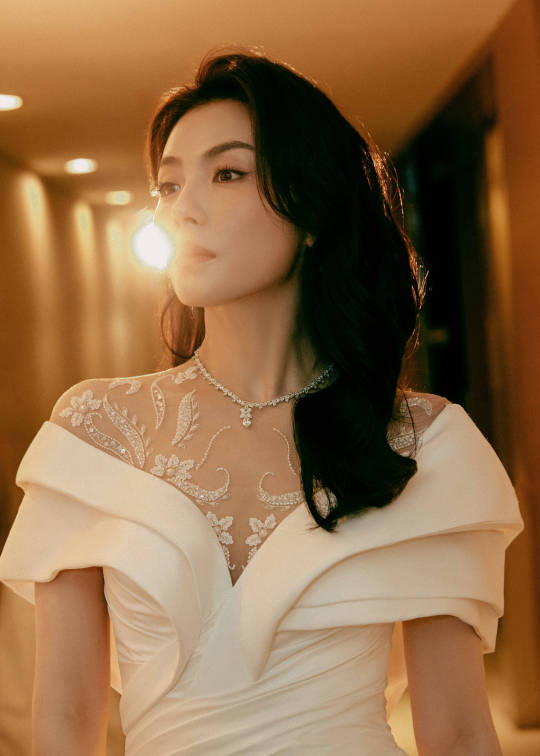
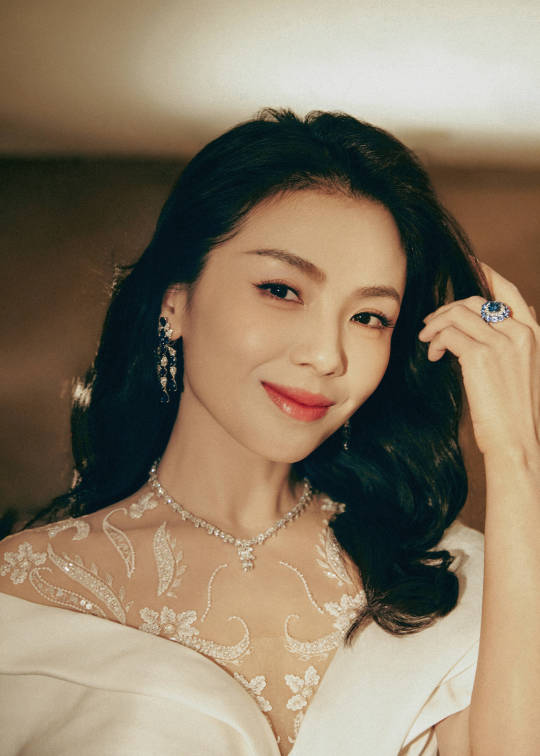
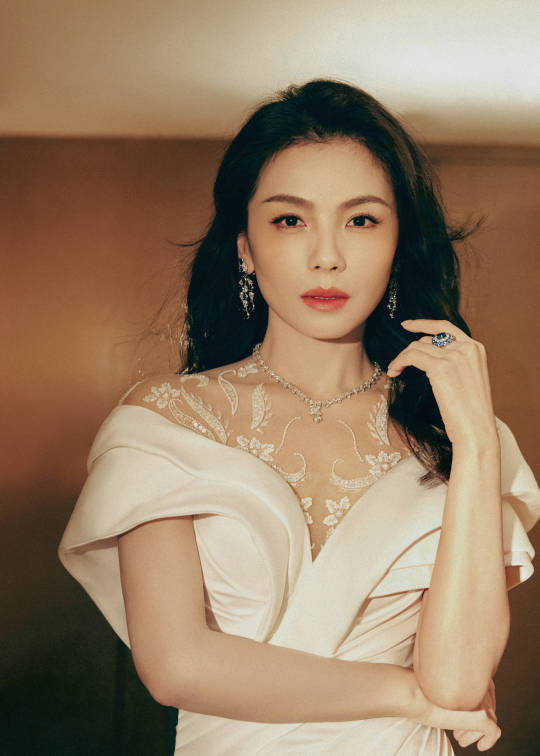
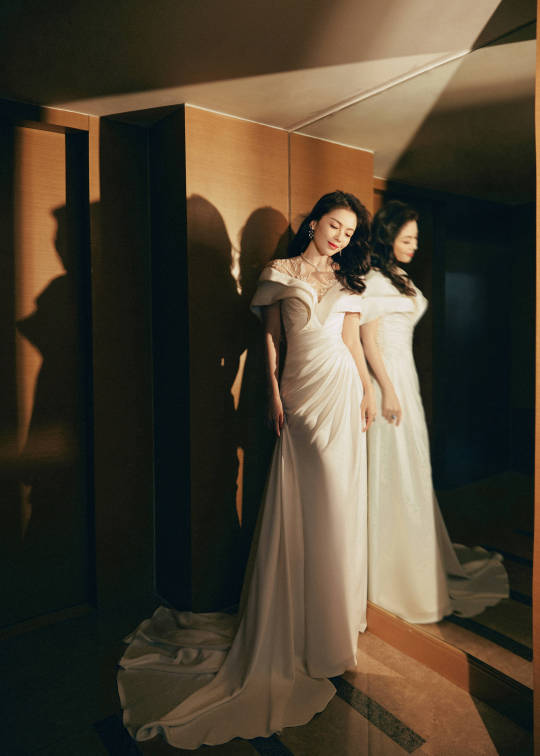


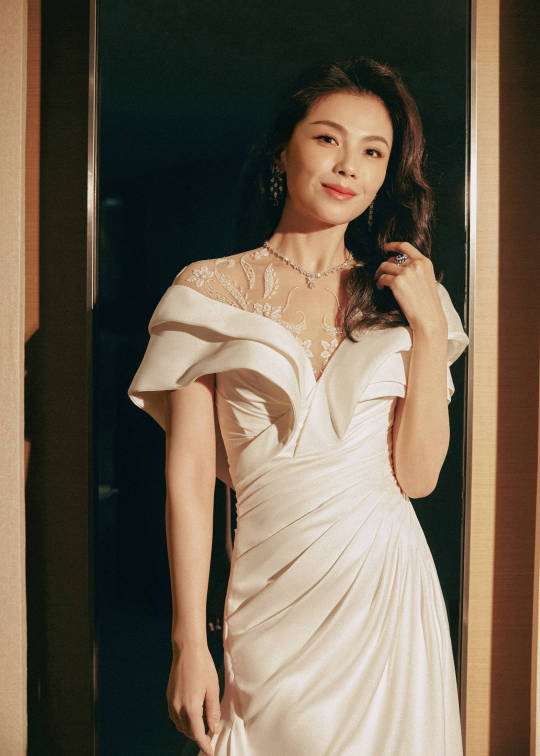
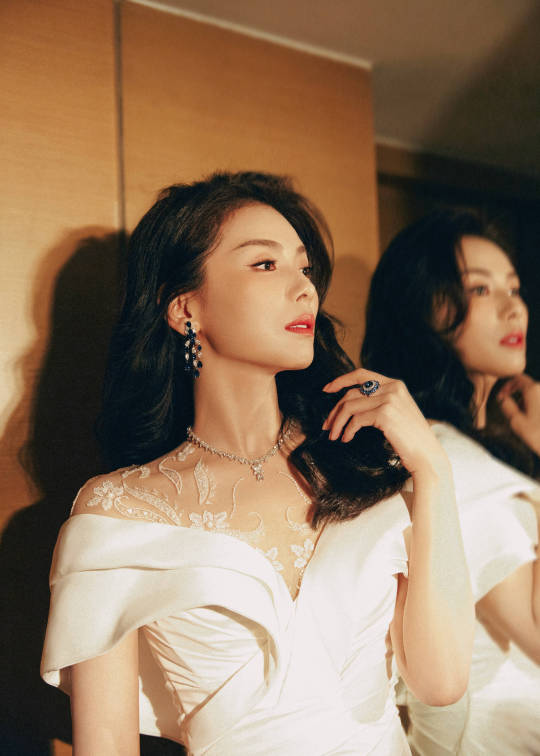
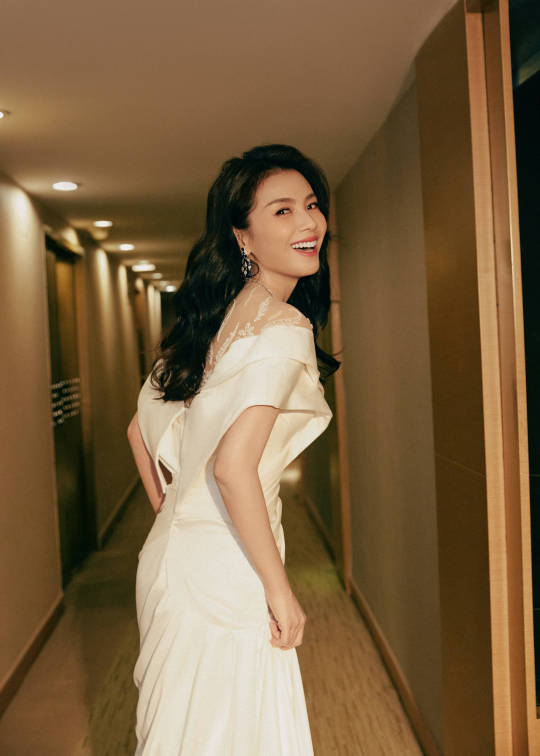
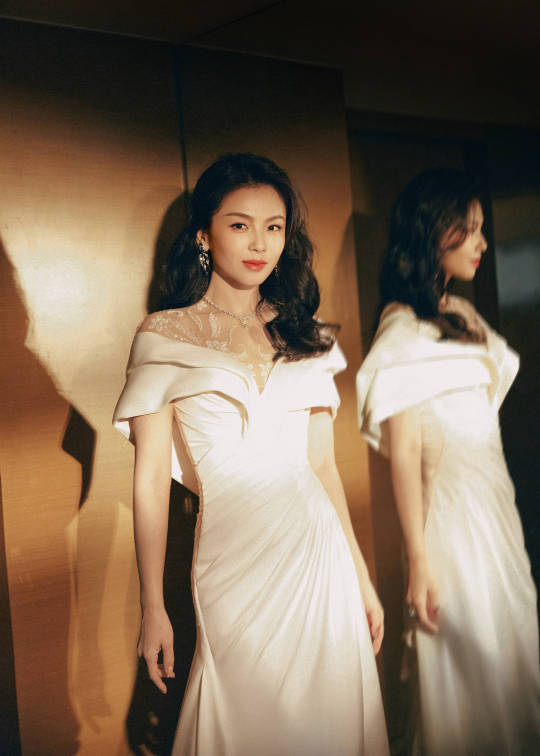

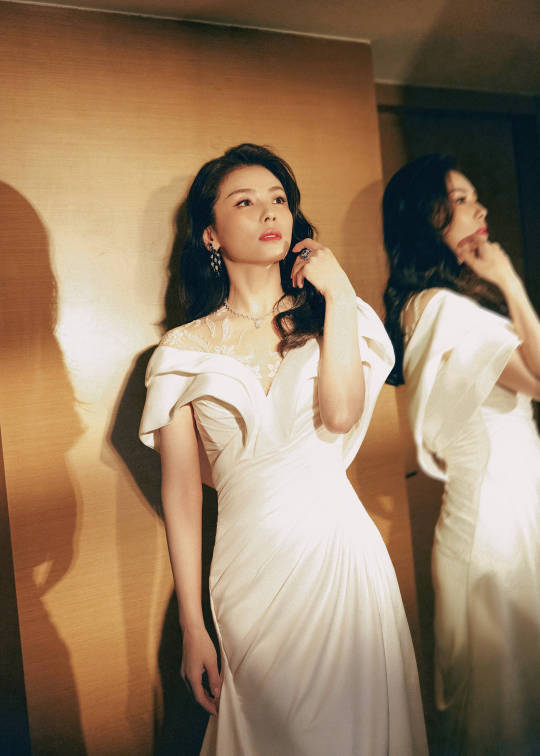
LIU TAO 刘涛 in Innocentia white dress | China Federation of Literary and Art Circles 2024 Spring Festival Gala
Liu Tao: more photos here
China Federation of Literary and Art Circles 2024 Spring Festival Gala : more photos here
#liu tao#tamia liu#刘涛#chinese actress#chinese fashion#fashion#cnladies#China Federation of Literary and Art Circles 2024 Spring Festival Gala#gala#spring festival gala 2024#spring festival#spring festival gala#year of the dragon#white dress#innocentia
12 notes
·
View notes